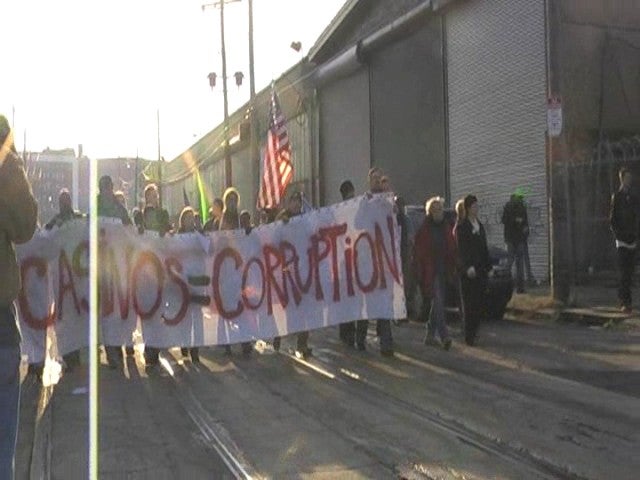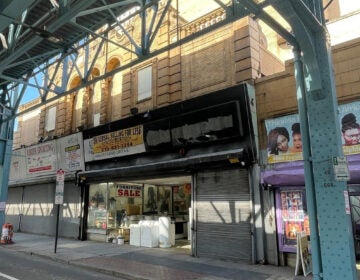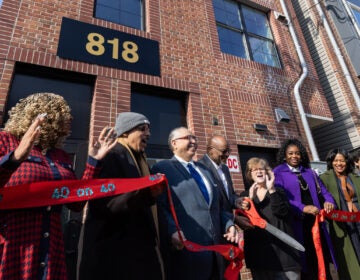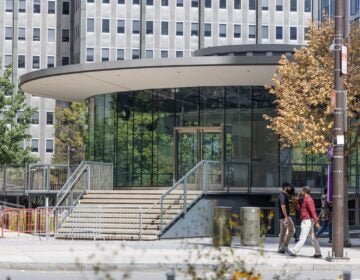Fallout from high court’s casino decision

Updated with city council appeal to Supreme Court;
documents: HSP1, HSP2, Foxwoods 1
Dec. 17
By Kellie Patrick Gates
For PlanPhilly
While SugarHouse Casino developers celebrate a Pennsylvania Supreme Court victory that gives them the zoning they need to build, opponents are meeting with their legal teams to plan their next moves in this multi-fronted battle over gambling on the Delaware Riverfront.
Monday, the court agreed with SugarHouse that the City of Philadelphia has stalled for too long on the various requests for zoning and permits made by SugarHouse: “We conclude that the undisputed documentation establishes the deliberate inaction by Council for the purposes of delay,” the decision reads. The Court then decreed that SugarHouse’s Delaware Avenue site is now in a Commercial Entertainment District – the zoning designation needed for casinos. And it said the SugarHouse development plan, already approved by the city planning commission, needs no further endorsement.
“We are gratified by this decision and excited about the opportunities ahead,” Bob Sheldon, the President of SugarHouse Casino, said in a written statement. The Court’s action will allow construction to begin “almost immediately,” he said.
Not so fast, opponents say.
They believe the court overstepped its proper judicial role by ruling on issues that should have been decided by City Council. From CasinoFree Philadelphia to the offices of Sen. Vince Fumo and Rep. Mike O’Brien, those who do not want the casino built at its proposed location are consulting with attorneys about possible legal action.
This could include asking the U.S. Supreme Court to look at the state court’s decision, said CasinoFree’s Daniel Hunter.
“(The State Supreme Court’s) job is to interpret law,” said Hunter. “They are creating public policy in opposition to public officials. They are becoming unelected politicians – and that’s the worst kind.”
The Supreme Court opinion and dissenting statement
But SugarHouse officials say they did not ask the court to bypass City Council, but rather to enforce an ordinance City Council created – Chapter 14-400 of the Philadelphia City Code, which establishes the Commercial Entertainment District zoning classification.
The code states that if council fails to act on a CED bill or Development Plan within 45 days or five sessions after the bill has been introduced, it is considered approved.
SugarHouse told the court the bills related to its CED request and development plan were introduced to Council on May 24, and that council held meetings on May 31, June 7, June 13, Sept. 17, Sept. 20 and Oct. 4. It also said that as of Oct. 25, 45 days had passed without action.
City Council told the Court that the approval provision did not apply in this case “because SugarHouse’s Plan of Development was not formally submitted to Council and because the CED Designation Bill has not been passed,” the Court decision states. SugarHouse responded that the clause says nothing about a “formal” submission. Council Member Juan Ramos introduced the Plan of Development, and a hearing was held on it in June. And the Planning Commission recommended that Council approve the CED designation in May.
The Court agreed with SugarHouse’s interpretation that City Council approved the plan and CED designation by not acting on them in a timely manner.
“City Council did all it has to do, and we thank them,” said SugarHouse spokeswoman Leigh Whitaker.
Rep. O’Brien and others wonder how the court could have found in favor of SugarHouse when just weeks ago it ruled against Foxwoods in a similar petition.
But officials for Foxwoods are also celebrating the court’s ruling. Spokeswoman Maureen Garrity said SugarHouse was farther along in the approval process when it filed its petition than Foxwoods was in June, when it filed. But since June, Foxwoods’ CED application was read into the City Council record, and the Planning Commission has approved its site plan.
Sometime this month, Foxwoods will update its petition, and officials are hopeful the Supreme Court will this time rule in its favor.
Those who disagree with the court’s decision are looking at other means of changing the outcome that do not involve asking a higher court to intervene.
Philadelphia City Council is today asking the State Supreme Court to reconsider its decision that granted SugarHouse Casino the zoning it needs to build.
“City council is filing an application for reargument,” said Brian Abernathy, spokesman for Councilman Frank DiCicco.
After the Court said yes to SugarHouse, Foxwoods – the other casino planned for the Philadelphia waterfront – updated its petition to the Supreme Court that seeks the same relief. The Court had denied a previous Foxwoods request, but casino officials say they weren’t as far a long in the permitting process as they are at this point. Based on the SugarHouse decision, they hope to succeed this time.
City Council last week filed a response to Foxwood’s second request, asking the Supreme Court to deny again.
CasinoFree’s Hunter is asking city employees and officials to break the law by violating the court’s order – even though that would be illegal.
“We’re asking that every level of city government – officials and bureaucrats – practice civil disobedience,” he said.
Opponents are working against the casinos’ riverfront sites on many different fronts, both in hopes that one will work and to put up logistical speed bumps to slow down the process.
This is partly in hopes that construction will not begin before pro-casino Mayor John Street is replaced by Mayor-elect Michael Nutter, who opposes the waterfront sites.
While SugarHouse president Sheldon says construction will begin in weeks, his company still needs a building permit and water/sewer permit from the City, and a federal permit under the Clean Water Act.
Whitaker said she expects SugarHouse will have the federal permit by next month.
At the recent Water Department Hearing, O’Brien submitted a long list of questions which he said must be answered prior to a permit being issued.
But Whitaker said she does not anticipate much delay since, “We’ve reached an agreement with the city to relocate and expand the sewer, which will help relieve flooding in the basement experienced by folks in Fishtown and Northern Liberties.”
In addition to building on the river bank, SugarHouse hopes to build into the river, on the area bounded by the pier head and the bulk head known as riparian or submerged lands. The City Commerce Department recently granted SugarHouse these rights – which Casino officials have said are not necessary, but will make the finished project much better.
Fumo, O’Brien and others have said they will appeal, on the basis that riparian lands belong to the Commonwealth and the Commerce Department usurped rights that belong to the state legislature. While riparian rights have most often been granted by an act of the legislature, SugarHouse attorneys argued that a 1907 law gives the Commerce Department that authority in Philadelphia. The city solicitor agreed.
Earlier today, the state House of Representatives’ Urban Affairs Committee discussed the Commerce Department ruling. O’Brien said his committee colleagues see the Commerce Department hearing as “not a gaming issue” but “a frontal assault on the sovereignty of the Commonwealth by the City of Philadelphia.”
The Committee sent to the House floor a bill that, based on the sovereignty issue, asks the State Attorney General to join in any appeal of the Commerce Department’s decision. O’Brien said he is hopeful a vote will be taken tomorrow.
If SugarHouse jumps all of these hurdles, CasinoFree’s Hunter said his members will physically impede the bulldozers. They are planning to practice this weekend.
Kellie Patrick Gates is a former Inquirer reporter. Contact her at kelliespatrick@gmail.com
WHYY is your source for fact-based, in-depth journalism and information. As a nonprofit organization, we rely on financial support from readers like you. Please give today.






